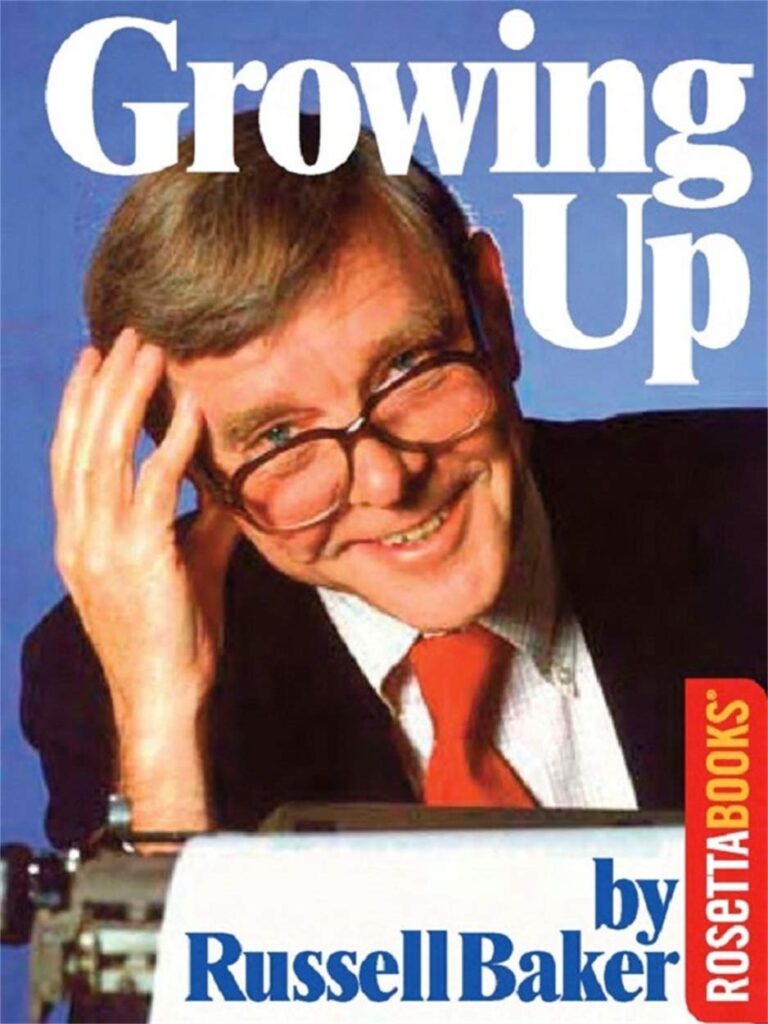
BORN almost 100 years ago, Russell Baker, the late New York Times columnist, belonged to the “greatest generation.” So-called because its members were, well, the greatest. They lived through the post-World War I years, the Great Depression, and World War II during which they fought. They were known for their resilience, work ethic, bravery and sacrifice. Many of them, like Baker, grew up poor when there was still no extensive welfare system as it exists today. But they worked hard, they dreamed big, and, considering the odds, they achieved a lot.
In 1983, Baker deservedly won the Pulitzer Prize for his memoir, “Growing Up.” Consider its title for a moment. “Growing Up.” Without flash, artless, but resonant and on point. Baker said he wrote the book because he wanted his children to know what the world was like when he was young and they did not exist. “I thought it important that they know this because, born in the gorgeously prosperous 1950s, they were likely to be spoiled by the comfort and plenty of American life,” he said. “As a child of the Great Depression, I wanted them to realize that their privileged American existence might be only a brief accident of history and that disaster was always lurking just over the horizon. Failure to be aware of this reality seemed to me likely to breed a dangerous softness, and I wanted my children to be hard as I thought I had been when growing up in less prosperous times.” He said he “sermonized” on the hardship of his childhood, and criticized them for lack of grit. “Their bored responses showed how tiresome I was,” he said. So he wrote a book instead.
It was his widowed mother who told him that it was time to make something of himself. He was eight years old, and among the household chores he was expected to perform was washing dirty dishes with his sister, who was six years old, and who also made beds and cleaned the house. “When she was only seven,” Baker wrote, “she could carry a piece of short-weighted cheese back to the A&P [grocery store], threaten the manager with legal action, and come back triumphantly with the full quarter-pound we’d paid for and a few ounces extra thrown in for forgiveness.”
Baker said his mother, who was often disappointed, wasted no energy on self-pity. “The Lord helps those who help themselves,” she would say. Baker said when he turned eight years old, his mother “decided that the job of starting me on the road toward making something of myself could no longer be safely delayed.” She wanted him to sell copies of the Saturday Evening Post, one of the most widely circulated and influential magazines at the time. But first he had to be interviewed by an executive of the publishing company.
“She introduced me. He bent low from the waist and shook my hand. Was it true as my mother had told him, he asked, that I longed for the opportunity to conquer the world of business?
“My mother replied that I was blessed with a rare determination to make something of myself.
“ ‘That’s right,’ I whispered.
“ ‘But have you got the grit, the character, the never-say-quit spirit it takes to succeed in business?’
“My mother said I certainly did.
“ ‘That’s right,’ I said….
“[H]e studied me as though debating whether I was worthy of a knighthood. Finally: ‘Are you trustworthy?’
“My mother said I was the soul of honesty.
“ ‘That’s right,’ I said.
“[He] smiled for the first time. He told me I was a lucky young man. He admired my spunk. Too many young men thought life was all play. Those young men would not go far in this world. Only a young man willing to work and save and keep his face washed and his hair neatly combed could hope to come out on top in a world such as ours.”
That was how they hired young boys to sell magazines back in the day. Today, you get free (federally funded) training in whatever your “passion” is, and the law requires employers to hire you regardless of your experience, competence or even willingness to show up for work — as long as you “qualify” based on the criteria drawn up by pandering politicians and enforced by career bureaucrats, who seem to believe that they know more about running a business than an actual businessperson.
Baker, in any case, didn’t like his job. On his first day, he failed to sell a single copy of the Saturday Evening Post.
“I told my mother I’d changed my mind about wanting to succeed in the magazine business.
“ ‘If you think I’m going to raise a good-for-nothing,’ she replied, ‘you’ve got another think coming.’ ”
At the time, he, his mother and sister lived in Belleville, New Jersey and it was 1932, “the bleakest year of the Depression.” His father had died two years before, “leaving us with a few pieces of Sears, Roebuck furniture and not much else, and my mother had taken [my sister] Doris and me to live with one of her younger brothers.” His uncle was a soft-drink salesman.
Baker’s indomitable mother had to drop out of college to take a teaching job after her debt-ridden father died of a heart attack. Her first teaching assignment was in a village “where children came barefoot to school and dropped out after fourth grade to take dollar-a-week work in the fields. Her youth became a succession of two-room schoolhouses, boarding with families of preachers and farmers prosperous enough to have a spare couch to rent for a few dollars a month.”
In those days, “grave illness was treated mostly with prayer, and early death was commonplace. Children were carried off by diphtheria, scarlet fever, and measles. I heard constantly of people laid low by typhoid or mortally ill with ‘blood poisoning.’ Remote from hospitals, people with ruptured appendixes died at home waiting for the doctor to make a house call. Since antibiotics lay far in the future, tuberculosis, which we called ‘T.B.’ or ‘consumption,’ was almost always fatal. Pneumonia, only slightly less dreaded, took its steady crop for the cemetery each winter…. Very few people ever saw the inside of a hospital.” Baker’s father, a stonemason, was diabetic when insulin was still unknown. He died at the age of 33.
In his final year in high school, Baker knew he must find a job after graduation. “Boys of our economic class didn’t ordinarily go to college,” he said. He considered a career in the grocery business, and was hired by a “self-service” store, which paid $14 for 12 hours’ work. His dream was to work the cash register, “the most glamorous job in the store except for the manager’s.” He also thought about becoming a railroad man. But then his friend and classmate told him he had to go to college, which Baker’s mother couldn’t afford. “Apply for a scholarship,” his friend replied. Back then scholarships weren’t outright grants, but was provided to a limited number of students if they could do well on a competitive examination. Night after night for three weeks, his mother helped him prepare for the exam, specifically mathematics, his weakest subject. They would stop when they were already worn out. Then, she went to bed and prayed. Baker said she believed in prayer, in the Lord’s intercession, but not in the Lord’s willingness to do it all. “She and I together had to help,” Baker wrote. “The Lord helped those who helped themselves.” Unlike his mother, however, Baker had no faith in prayer, and he thought that God was a “cosmic trick player.” But on the day of the exam, and in a huge lecture hall filled with boys, “each of whom probably wanted one of the few available scholarships as desperately as [he] did,” Baker, a la Pascal, “decided it was foolish to leave even the remotest possibility untouched.” So he uttered the Lord’s Prayer in his head, and followed it with the only other prayer he knew: “Now I lay me down to sleep, I pray the Lord my soul to keep…”
The exam lasted four hours. Two excruciating weeks later, he received a letter from the university (Johns Hopkins), which informed him that he had been awarded a scholarship.
“Well,” his mother said, “I always knew you could do it…. I think I’ll make us some iced tea.” “She had to do something ordinary, I suppose, or risk fainting with delight,” Baker said. “We had helped ourselves, the Lord had helped us in return…. Something had come along.”
And it wasn’t a federal grant.
Send feedback to editor@mvariety.com











